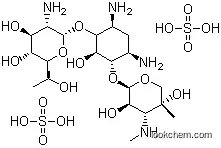108321-42-2 Usage
Description
Geneticin (also known as G418, G418 sulfate) is an aminoglycoside antibiotic similar in structure to gentamicin B1, produced by Micromonospora rhodorangea. Geneticin blocks polypeptide synthesis by inhibiting the elongation step in both prokaryotic and eukaryotic cells and is commonly used in laboratory research to select genetically engineered cells. Resistance to Geneticin is conferred by the neo gene from Tn5 encoding an aminoglycoside 3'-phosphotransferase, APH 3'II.
Chemical Properties
white to off-white powder
Uses
Geneticin is an aminoglycoside antibiotic similar in structure to gentamicin used for selection and maintenance of prokaryotic and eukaryotic cells. Optimal concentrations for selection and maintenance vary by cell lines. Bacteria and algae require 5 μg/mL or less while animal cells may require 300-500 μg/mL. It is also used to membrane-permeant allosteric effector of hemoglobin therapeutic in cardiovascular diseases and cancer.
Application
Geneticin's most common application is in molecular biology as a selection agent. Geneticin(G418 sulfate) is toxic to bacteria, yeast, protozoa, helminths, and mammalian cells. Resistance is conferred by one of two dominant genes of bacterial origin which can be expressed in eukaryotic cells. G418 is water soluble and can be stored at room temperature for as long as 1 year. Aqueous solutions should be stored frozen. The amount of G418 required for selection will vary with each cell type and growth cycle. Although cells that are multiplying will be affected sooner than those that are not, cells that are in log phase will still require 3 to 7 days for selection. In general, the amount of G418 required for selection of mammalian cells is 400 mg/ml and 200 mg/ml for maintenance.
General Description
The optimal concentration of G418 for selection of resistance will vary according to the organism and/or cell type under investigation. In general, the concentration of active drug required for selection is as follows: Dictyostelium sp.: 10-100 μg/ml Plant cells: 10-100 μg/ml Yeast cells: 0.5-1.0 μg/ml Mammalian cells: 0.1-2.0 μg/ml
Biochem/physiol Actions
Mode of Action: G418 blocks polypeptide synthesis and protein elongation by inhibiting synthesis at the 70S and 80S ribosomes.Antimicrobial Spectrum: G418 selects for cells stably transfected with an iNOS promoter construct and neomycin resistance gene and shows activity against protozoa and helminthes.
Mode of action
Geneticin works by blocking polypeptide synthesis by preventing the elongation step within eukaryotic cells.Resistance: Resistance to Geneticin is conferred through the NPTll gene in plant cells and the NEO gene in mammalian cells, which encodes aminoglycoside 3'-phosphotransferase.Action: Geneticin functions by causing a chain of nonsense mutations during translation, ultimately resulting in inhibition of polypeptide synthesis and protein elongation.
references
[1] bar-nun s, shneyour y, beckmann js. g-418, an elongation inhibitor of 80 s ribosomes. biochim biophys acta. 1983, 741 (1): 123-7.[2] julian davies and antonio jimenez. a new selective agent for eukaryotic cloning vectors. am. j. trop. med. hyg. 1980, 29 (5): 1089-1092.[3] xianchao g. zhang, peter w. mason, edward j. dubovi, xiaodong xu, nigel bourne, randall w. renshaw, timothy m. block, and alexander v. birk. antiviral activity of geneticin against dengue virus. antiviral res. 2009 july, 83(1): 21–27.
Check Digit Verification of cas no
The CAS Registry Mumber 108321-42-2 includes 9 digits separated into 3 groups by hyphens. The first part of the number,starting from the left, has 6 digits, 1,0,8,3,2 and 1 respectively; the second part has 2 digits, 4 and 2 respectively.
Calculate Digit Verification of CAS Registry Number 108321-42:
(8*1)+(7*0)+(6*8)+(5*3)+(4*2)+(3*1)+(2*4)+(1*2)=92
92 % 10 = 2
So 108321-42-2 is a valid CAS Registry Number.
InChI:InChI=1/C20H40N4O10.2H2O4S/c1-6(25)14-11(27)10(26)9(23)18(32-14)33-15-7(21)4-8(22)16(12(15)28)34-19-13(29)17(24-3)20(2,30)5-31-19;2*1-5(2,3)4/h6-19,24-30H,4-5,21-23H2,1-3H3;2*(H2,1,2,3,4)/t6?,7-,8+,9-,10-,11+,12-,13-,14-,15+,16?,17-,18-,19?,20+;;/m1../s1


